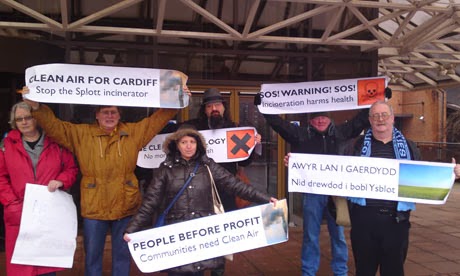MEDIA BRIEFING by Cardiff Against the Incinerator - CATI
Pauline v Cardiff
council
Splott
incinerator protesters take Cardiff Council to the High Court
Rob Griffiths, from CATI said: “CATI is taking
Cardiff council to court in order to protect local residents, businesses and
the environment.”
The full legal hearing to quash
Cardiff's approval of the Viridor waste incinerator [1] is now scheduled to
start Tuesday 17 December, for two days in the Cardiff High Court.
 |
Dave Prosser, Pauline, Anne, Max
|
The leading environmental and public law firm, Richard Buxton, is
representing CATI member, Pauline Ellaway.
The full hearing should consider whether “the process adopted by the Defendant Council amounted to
an impermissible extension or addition to any previously-recognised exception
to the Whitley principle”.
 (Viridor) in the first place in proceeding to begin works prematurely, as they did, and of the Defendant Council (Cardiff) in protesting only after being prompted to do so by CATI, and then effectively condoning such conduct in the ways in which it subsequently dealt with matters”, raises questions of the Council’s “procedural propriety”.
(Viridor) in the first place in proceeding to begin works prematurely, as they did, and of the Defendant Council (Cardiff) in protesting only after being prompted to do so by CATI, and then effectively condoning such conduct in the ways in which it subsequently dealt with matters”, raises questions of the Council’s “procedural propriety”.
CATI
opposed the incinerator in principle, Dave Prosser a CATI campaigner said “We feel
betrayed by Cardiff Council’s completely inadequate consultation of the public
over this matter of high public concern and in pushing through approval of the
incinerator in the Splott/Cardiff Bay area despite the large population
potentially harmed by the pollution” [4].
The Ombudsman decided in 2012 on a complaint from CATI that the Council
was guilty of maladministration, causing an injustice to residents [5]. The Council had to apologise to individuals
but failed to reconsider and change their poor practice.
This High
Court hearing is, however, confined to technical issues of planning law. Anne Greagsby CATI campaigner points out “CATI accuses Cardiff Council of undermining
the law by allowing building work to proceed without the necessary permits and
permissions.”
Max Wallis a CATI campaigner said
“The whole planning permission process has been an undemocratic shambles.
The wishes of local people and businesses have been ignored and councillors
have tied themselves in knots as officials steamrollered Viridor's scheme
through the Council.”
<iframe width="560" height="315" src="//www.youtube.com/embed/ckCQVkYuljQ?rel=0" frameborder="0" allowfullscreen></iframe>
Contact
Pauline Ellaway 07837 346114 20
Bayside Road, Bayside Estate, Cardiff
CF24 5NA
Max Wallis 07714 163254 or 02921 156265 or 02920 190087
Dave Prosser 07504 323422
NOTES
[1]
Waste incinerator under construction at Trident Park, between Splott and
Cardiff Bay, at a cost of £185 million.
Construction started in July 2012, just as further ‘subsequent’ planning
applications were published for consultation. These were not approved till Feb. 2013; the
Court case challenges them as legally flawed.
 [2]
Judge Curran
approved for a full expedited hearing of the request to the Cardiff High Court
lodged on 26th March for the following:
[2]
Judge Curran
approved for a full expedited hearing of the request to the Cardiff High Court
lodged on 26th March for the following:
a) An
order quashing the grant of subsequent applications approval dated 25 February
2013;
b) A
declaration that the decision of the Council to treat the subsequent
applications approval as retroactively permitting the unlawful works and
rendering enforcement action inexpedient was unlawful;
c) An
order requiring the Council to reconsider enforcement action against the
unlawful works;
d) An order directing the Council to issue
an enforcement notice and/or stop notice prohibiting further continuation of
unlawful development
[3]
Full judgment 27 Sept’13 [2013] EWHC
2907(Admin) at <high-court-justice.vlex.co.uk/vid/-465183198>
[4] Entirely unsuitable for the Splott and Cardiff Bay
site on grounds of lorry traffic, flood risk, hazard to health and
processing hazardous ash.




